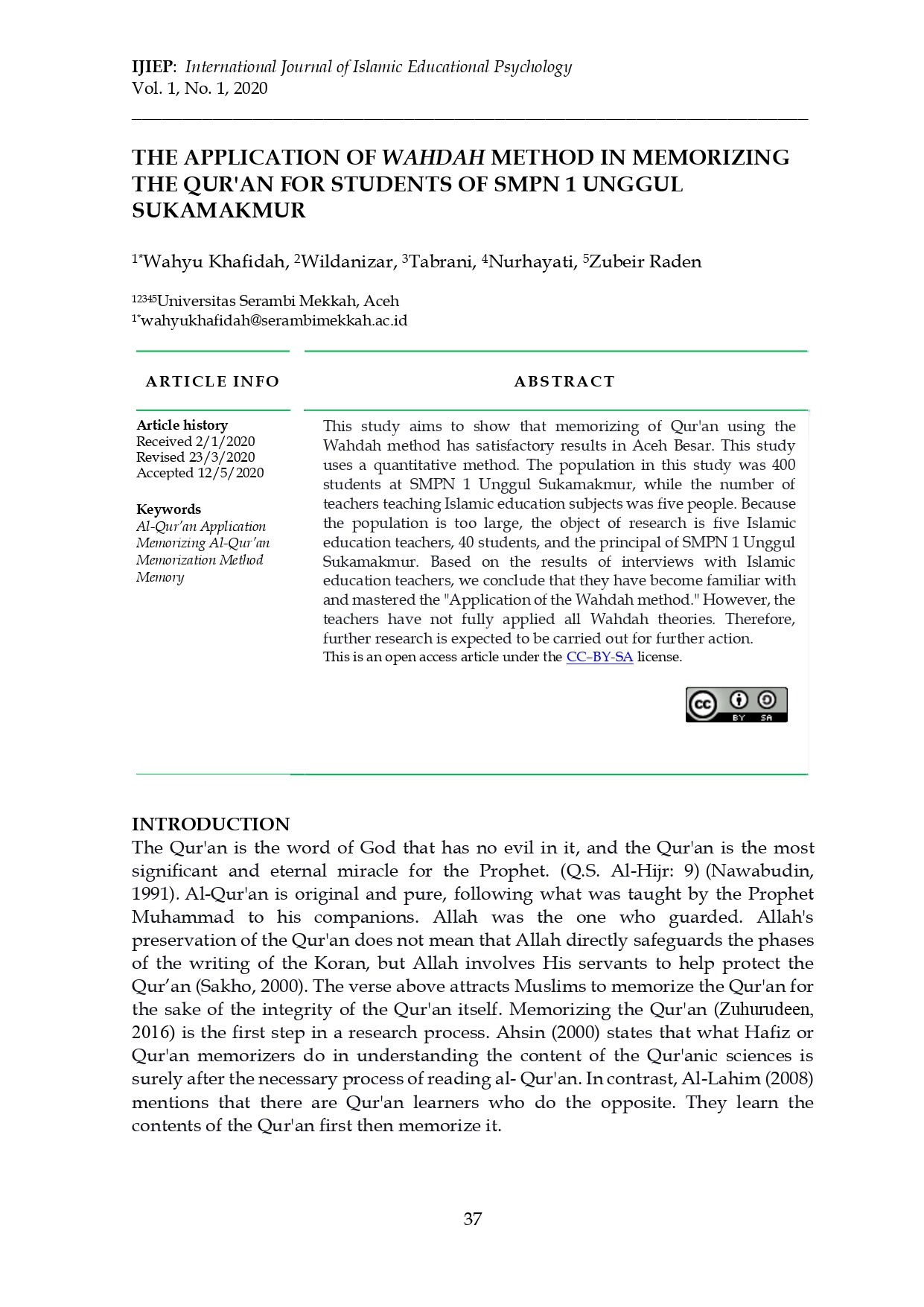The Application of Wahdah Method in Memorizing the Qur'an for Students of SMPN 1 Unggul Sukamakmur
DOI:
https://doi.org/10.18196/ijiep.1104Keywords:
Wahdah Method, Al-Qur’an, Memorizing Al-Qur’an, Memorization Method, Memory.Abstract
This study used a quantitative approach. The population in this study were 400 students in SMPN 1 Unggul Sukamakmur, while the number of teachers teaching Islamic education subject was 5 people. Since the population was too large, the objects of research were 5 Islamic education teachers, 40 students (10% of the population), and the principal of SMP N 1 Unggul Sukamakmur. Based on the results of interviews with Islamic education teachers, the researchers could see that they have been familiar and mastered the "Application of the Wahdah method." However, the teachers have not applied all the Wahdah theories entirely. In table 4.5, students applying Wahdah's methods were 95%. Table 4. 6 showed other methods used in addition to memorizing Qur'an. The memorization method was 90%, and the recitation or Tilawah method was 10%. Table 4. 7 showed how many times a week, the students learned the Qur'an using the Wahdah method, and the answer 100% was four times a week.
References
Abdu al-Rabb Nawabudin. (1988). Metode Efektif Menghafal al-Qur’an. Jakarta: CV Tri Daya Inti.
Abdul Aziz Abdul Rauf. (2004). Kiat Sukses menjadi Hafidz Qur’an Da’iyah. Bandung: Syaamil Cipta Media.
Abdurrab Nawabudin. (1991). Teknik Menghafal Al-Qur’an. Bandung: Sinar Baru.
Ahmad Syadali dan Ahmad Rofi’i. (1997). Ulumul Qur’an. Bandung: PT Pustaka Setia.
Ahsin, W. (2000). Bimbingan Praktis Menghafal Al-Qur’an. Jakarta: Bumi Aksara.
Al-Attas, R. (2011). The Qur’an and memory a (study of the effect of religiosity and memorizing Qur’an as a factor on memory). Alzheimer’s & Dementia, 7(4), S641. https://doi.org/10.1016/j.jalz.2011.05.1838
Al-Lahim, K. bin A. K. (2008). Mengapa Saya Menghafal Al-Qur’an. Surakarta: Daar An-Naba.
Al-Saggaf, M. A., Yasin, M. S. M., & Abdullah, I. H. (2014). Dualism of Soul-person in English Translated Texts of the Qur’an. Procedia - Social and Behavioral Sciences, 118, 42–50. https://doi.org/10.1016/j.sbspro.2014.02.006
Amjad Qosim. (2008). Hafal al-Qur’an Dalam Sebulan. Solo: Amjad Qosim.
Aqel, M. J., & Zaitoun, N. M. (2015). Tajweed: An Expert System for Holy Qur’an Recitation Proficiency. Procedia Computer Science, 65, 807–812. https://doi.org/10.1016/j.procs.2015.09.029
Arifin, M. (1996). Ilmu Pendidikan Islam. Jakarta: Bumi Aksara.
El-Seedi, H. R., Khalifa, S. A. M., Yosri, N., Khatib, A., Chen, L., Saeed, A., … Verpoorte, R. (2019, October 28). Plants mentioned in the Islamic Scriptures (Holy Qur’ân and Ahadith): Traditional uses and medicinal importance in contemporary times. Journal of Ethnopharmacology, Vol. 243, p. 112007. https://doi.org/10.1016/j.jep.2019.112007
Gerungan, W. A. (1986). Psikologi Sosial. Bandung: Eresco.
H.A. Muhaimin Zen. (1998). Pedoman Pembinaan Tahfidzul Qur’an. Jakarta: Pustaka Al-Husna.
Ibnu Hajar al-Asqalany. (1993). Fathu al-Bary Syarh Shahih BuOiari, Juz 10. Beirut: Dar al-Fikr.
M. Suud, F. (2017). Amsal al-Qur’an: Sebuah Kajian dalam Psikologi Pendidikan Islam. FIKROTUNA, 5(1). https://doi.org/10.32806/jf.v5i1.2952
Muhammad Ali As-shibuni. (282AD). Shofwah at-Tafsir. Jakarta: Dar kutb Al-Islamiyah.
Sakho, M. A. (2000). Kiat-Kiat Menghafal Al-Qur’an. Jawa Barat: Badan Koordinasi TQA.
Suharsimi Arikunto. (1993). Prosedur Penelitian Suatu Pendekatan Teori Dan Praktek. Jakarta: Rineka Cipta.
Surahmad, W. (2002). Prosedur Penelitian Suatu Pendekatan Praktek. Jakarta: Rineka Cipta.
Sutari Imam Barnadib. (1987). Pengantar Ilmu Pendidikan Sistematis. Yogyakarta: FIP, IKIP.
Sutrisno Hadi. (1990). Metodologi Riset. Yogyakarta: Andi Offset.
Suud, F., & Subandi, . (2018). Kejujuran dalam perspektif psikologi Islam. Jurnal Psikologi Islam, 4(2), 121–134. Retrieved from http://jpi.api-himpsi.org/index.php/jpi/article/view/44
Syachrul, R. M. M. A. K., Bijaksana, M. A., & Huda, A. F. (2019). Person entity recognition for the Indonesian Qur’an translation with the approach hidden Markov model-viterbi. Procedia Computer Science, 157, 214–220. https://doi.org/10.1016/j.procs.2019.08.160
Syaifuddin Azwar. (2005). Metode Penelitian. Yogyakarta: Pustaka Pelajar.
Syaiful Romadhon, M., Rahmah, A., & Wirani, Y. (2019). Blended learning system using social media for college student: A case of tahsin education. Procedia Computer Science, 161, 160–167. https://doi.org/10.1016/j.procs.2019.11.111
Winarno Surahman. (1992). Pengantar Penelitian Ilmiah Dasar Metode dan Tehnik. Bandung: Tarsito.

Downloads
Published
How to Cite
Issue
Section
License

- Share — copy and redistribute the material in any medium or format
- Adapt—remix, transform, and build upon the material for any purpose, even commercially.
The licensor cannot revoke these freedoms as long as you follow the license terms. Under the following terms:
- Attribution: You must give appropriate credit, provide a link to the license, and indicate if changes were made. You may do so in any reasonable manner, but not in any way that suggests the licensor endorses you or your use.
- ShareAlike: If you remix, transform, or build upon the material, you must distribute your contributions under the same license as the original.
- No additional restrictions — You may not apply legal terms or technological measures that legally restrict others from doing anything the license permits.






